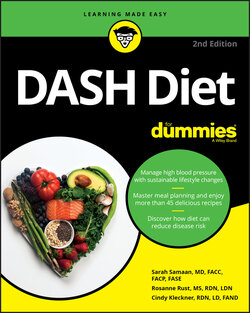Читать книгу DASH Diet For Dummies - Sarah Samaan - Страница 35
THE CASE FOR SALT REDUCTION
ОглавлениеAlthough it’s true that a few studies haven’t confirmed a link between sodium and high blood pressure, the overwhelming majority of research conducted over the past 50 years (analyzing more than 250,000 individuals, we might add) has established a strong, stepwise connection between salt intake and high blood pressure.
If stodgy scientific research is hard to make heads or tails of, consider this: In those dwindling societies that exist outside of the grasp of modern life, free of modern grocery stores and fast food, hypertension rarely happens, even in old age. This phenomenon has many reasons, of course, but one important contributor appears to be the low-salt, high-potassium diet of these literally down-to-earth cultures.
An analysis by the World Health Organization estimates that by simply cutting average salt consumption around the globe by 15 percent, more than 8.5 million lives would be saved over the next 10 years. That’s a hard statistic to argue with.
Although this is a goal that shouldn’t be difficult to achieve, the average American diet includes about 3,400 milligrams of salt daily. Cutting this amount by 15 percent would get down to about 2,900 milligrams daily, which is still substantially higher than the recommendations by the Centers for Disease Control and Prevention (CDC). For optimum health, the CDC recommends a maximum daily sodium intake of 2,300 milligrams for most people age 50 and under. For those over 50, African Americans of any age, and people with hypertension, diabetes, or congestive heart failure, the recommended limit is 1,500 milligrams. The CDC also advises obese individuals to adopt a lower-salt diet because obesity tends to increase salt sensitivity and fluid retention. Overall, though, far fewer than 10 percent of Americans stay within these guidelines.
Remember: If your blood pressure tends to run low, or if it drops when you stand up, then a low-sodium diet may not be right for you. For some people, this may be a sign of dehydration or anemia. If you have low blood pressure or symptoms of dizziness, be sure to check with your doctor before making a change.
When pitted against the high-sodium control diet, the low-sodium DASH diet dropped systolic blood pressure by 11.5 points in people with hypertension. The effect was even greater (12.6 points) for black people. Women benefited more than men. Even those without hypertension saw their blood pressures fall by about 7 points. Diastolic blood pressure dropped as well, but the effect wasn’t as dramatic, averaging about a 4.5-point difference between the high-sodium control diet and the low-sodium DASH group.
Because most people consistently eat too much salt, you may worry that a sudden change in sodium intake could cause side effects, even if, in the long run, it’s better for you. To the contrary: There were fewer headaches and no differences in any other symptoms reported.
